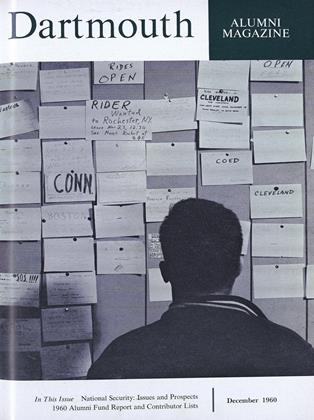ByEarl H. Blaik and Tim Cohane. NewYork: Holt, Rinehart and Winston, 1960.430 pp. $4.95.
Earl H. "Red" Blaik, adopted member of '19, was head football coach at Dartmouth for seven seasons, 1934 through 1940, and during the Blaik regime his Big Green teams won 45 games, tied four, and lost only fifteen. There are countless Dartmouth men who swear that Red Blaik was the best coach the College ever had or probably ever will have. There are almost as many others who just as vehemently contend that Blaik was too much of a martinet, that he paid too high a price for victory, and was the wrong type of coach for an Ivy League college such as Dartmouth.
Never a man to equivocate, Blaik states his own case succinctly in this passage midway through the book You Have to Paythe Price, which he co-authored with Tim Cohane, sports editor of Look Magazine:
"Our major problem at Dartmouth was to replace the spirit of good fellowship, which is antithetical to successful football, with the Spartanism that is indispensable....The successful coach is the one who can sell the Spartan approach, the one who is able to get a willing acceptance from his men that victory or success demands, a special price."
The price that Blaik had to pay for victory and success, and that his players at Dartmouth and West Point also paid, is spelled out dramatically in this semi-autobiography which is great reading for football fans in general, and more particularly for Dartmouth men who played under him or watched his Big Green teams in action.
Two full chapters, totaling some fifty pages, are devoted to Blaik's Dartmouth days, and they are full of the color, excitement, anecdotes and personalities that made for some of the most glorious annals in the Big Green gridiron history. The author recounts in stimulating detail the great Dartmouth games of that era from the 14-6 victory over Yale in 1935, which snapped the so-called Yale jinx, to the highly publicized 3-0 fifth-down win over Cornell in 1940. Among the Dartmouth greats of that decade who come alive both on and off the field are: All-American Bob MacLeod, Carl Ray, Dave Camerer, Harry "Heavenly" Gates, Johnny Handrahan, Lou Young, Gus Zitrides, Bill Hutchinson, Merrill Davis, and many others. A list of Dartmouth football lettermen, 1934 through 1940, is given.
Blaik's warm affection for Dartmouth and Hanover and for many of the Dartmouth family, from Prexy Hopkins down, shines through clearly in these pages and leads the author into what West Pointers might consider almost treasonable passages such as this:
"I would say that, as a whole, the Dartmouth players were more interesting as people than the West Point Cadets, because they had more time to lead a normal life. Our players were interested in everything and argued about everything. This was the result of the stimulating, inquiring atmosphere of the liberal arts college and the all-permeating influence of President Hopkins."
But Blaik cannot resist a parting crack at the "deterioration" of Ivy League football and a claim that "the game has been purposely devaluated" by the Ivy presidents. To restore Ivy League football to its former stature, Coach Blaik suggests: (1) Twenty days of spring football practice, (2) a return to unlimited substitution (two platoon) football, and (3) the scheduling of several games outside the league with major opponents such as Georgia Tech, Michigan, Texas, and Stanford.
Much of the volume, understandably, is given over to Blaik's coaching career at West Point, to the exploits of his great Cadet teams, and the stars who manned those teams, with a full chapter devoted to the "full inside story" of the ninety cadets, including most of his 1951 football squad, who were expelled from the Academy. It was in that year, incidentally, that Dartmouth defeated Army in football 28-14 for the first and only time. You have to pay the price ($4.95) for this book, but it's well worth it!
 View Full Issue
View Full Issue
More From This Issue
-
 Feature
FeatureNATIONAL SECURITY: Issues and Prospects
December 1960 By LOUIS MORTON, -
 Feature
FeatureINSTITUTIONAL PURPOSE in the Undergraduate College
December 1960 -
 Feature
FeatureUNDERWATER TREASURE
December 1960 -
 Feature
FeatureThe Man Behind the Figures
December 1960 -
 Feature
FeatureALUMNI FUND ENDOWMENT FUNDS
December 1960 -
 Feature
FeatureCollege's Annual Outlay Now Totals $12 Million
December 1960
CLIFF JORDAN '45
-
 Sports
SportsBaseball
May 1953 By Cliff Jordan '45 -
 Sports
SportsTennis
May 1953 By Cliff Jordan '45 -
 Article
ArticleSwimming
January 1954 By CLIFF JORDAN '45 -
 Article
ArticleSwimming
April 1954 By CLIFF JORDAN '45 -
 Article
ArticleGreen Jottings
April 1956 By CLIFF JORDAN '45 -
 Feature
FeatureSGT. BROWN'S RUGGED BOYS
May 1962 By CLIFF JORDAN '45
Books
-
 Books
BooksAlumni Articles
OCTOBER 1969 -
 Books
BooksTHE END IS NOT YET
March 1942 By David Lattimore. -
 Books
BooksBRITISH POLICY AND THE TURKISH REFORM MOVEMENT
May 1943 By E. B. Watson '02 -
 Books
BooksKEATON.
DECEMBER 1967 By J. BLAIR WATSON -
 Books
BooksINTERNATIONAL TAX PLANNING.
July 1974 By J. PETER WILLIAMSON -
 Books
BooksFAINTING.
April 1951 By SVEN M. GUNDERSEN, M.D.


